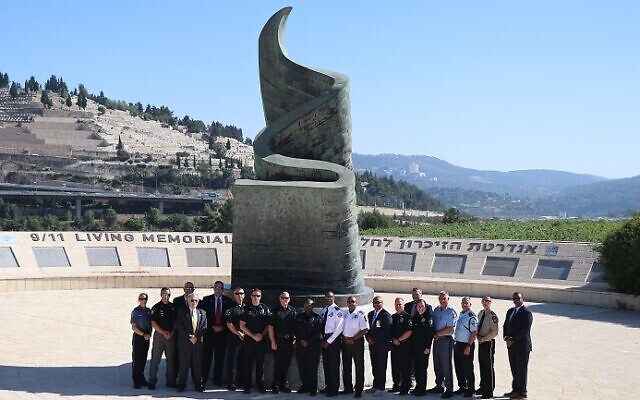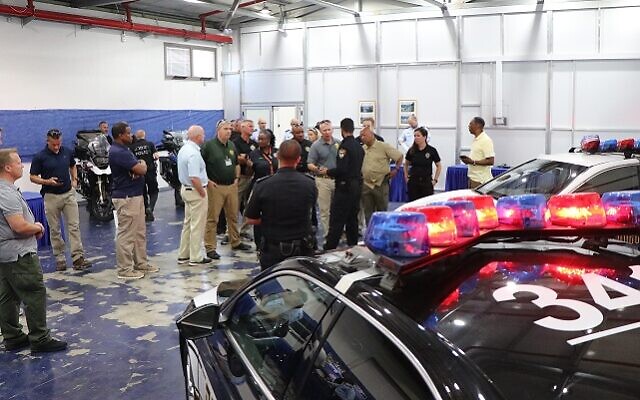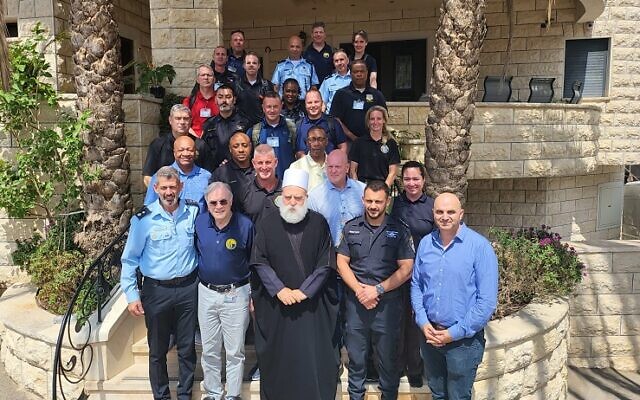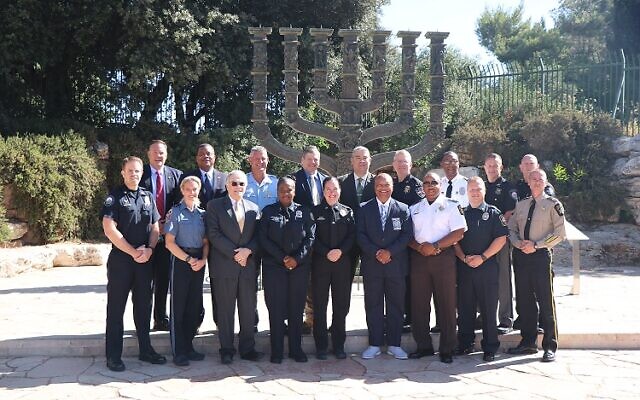Law Enforcement Delegation Visits Israel
A 16-member assembly participated in the Georgia International Law Enforcement Exchange’s (GILEE) 29th annual peer-to-peer executive training program.

A 16-member delegation composed of police chiefs, command staff, sheriffs and other law enforcement officials mostly from Georgia has returned from Israel after participating in the Georgia International Law Enforcement Exchange’s (GILEE) 29th annual peer-to-peer executive training program.
Criminologist Robert Friedmann, originally from Israel, accompanied the police leaders on their trip. Friedmann established GILEE as part of the Andrew Young School of Policy Studies at Georgia State University in 1992.
Originally, the program’s purpose was to unite local and Israeli police in an exchange of strategies aimed at increasing anti-terrorism efforts ahead of the 1996 Atlanta Olympics.
While Olympic security continued to be a focus for GILEE for several years afterwards, the program shifted over time to focus more on community policing, leadership and enhancement of public safety. Similarly, the program has expanded in scope — now encompassing 30 states in the U.S. and 30 countries globally. Executive law enforcement training programs, like the one the Georgia delegates participated in, make up around 290 of the over 590 programs GILEE has carried out to date.
These training programs don’t focus on tactical training but instead are, as Friedmann said, “based on peer-to-peer training — how to manage a business.”

Viewing police chiefs as CEOs of companies providing public services led to a focus on logistics, intelligence and investigations. According to Friedmann, a large part of the benefit of the exchange program was that police from different countries could be inspired by strategies used by others, without being forced to adopt them exactly.
One example was the use of cameras. Former Atlanta Police Chief George Turner (then deputy chief) was impressed by the number of cameras in Jerusalem and their distribution across the city, wanting to emulate the system in Atlanta. Years later, Friedmann received a call from an Israeli delegation that wanted to visit Atlanta to see how the city used its cameras.
“Wait a minute,” he said, “we got those cameras from you!” As it turns out, however, the system set up by Turner included a mix of public and private cameras — something that had not yet been attempted in Jerusalem, where all the system’s cameras were public.

The program also focuses heavily on community outreach. “There is a lot of police-to-police exchange,” said Friedmann. “We try to do more than that.” He described how, in a previous program, delegates visiting archaeological sites in the city of Akko complained to him, saying, “Why go below ground and look at stones, why not go above ground and meet with people?”
So that’s what they did. Delegates in a later program got to witness discussions between Akko’s chief rabbi and the imam of one of the city’s most important mosques. This past June, the delegation met with a spiritual leader of the Druze community, a religious/ethnic minority in Israel.
“We learned a lot about community policing, how they are able to bridge the gap between multiple cultures and religions, in a very careful way,” said Chief Celeste Murphy, who led the delegation. Currently chief of police for the Chattanooga (Tenn.) Police Department and former deputy chief of the Atlanta Police Department, Murphy had previously participated in the program in 2017. “It shows they have a compassion for the people they serve, and that’s a lesson that we could of course refresh on,” she said.
Murphy also noted the technological advancements, such as using drones alongside or instead of first responders in various scenarios, as well as general strategies to be more productive and effective, especially when dealing with personnel shortages. She had high praise for the program: “It broadens your leadership scope, and I came back with a lot of projects for myself that I’d like to install here in my police department.”
Both Friedmann and Murphy noted the importance of the program in exposing participants to global police practices, and both the differences and similarities with their own.
“In Israel it’s a centralized police, so if you go from the north to the south it’s the same uniform, same protocol, same functions,” said Friedmann. “Here you have 18,000 agencies that are dressed differently, run differently and budgeted differently, so they looked at issues of communication in a certain sense somewhat enviously — yet policing is policing, and that’s what they focus on.”

Murphy emphasized how vital this was: “This program should definitely continue because it takes us out of the mindset of what we’re always doing, it gives us a different perspective, it teaches us that although we’re miles apart, we’re experiencing the same issues, the same concerns, the same problems.”
While it’s difficult to measure the specific impacts of the program, both the expansion of various programs and responses from both the participants and the community point to its vitality. Exchanges between Israel and Georgia continue, including between the nations’ forensic labs, between their bomb technicians and in local courses, such as a recent one that put a focus on alternatives to deadly force (a strategy Murphy noted as a vital part of the recent Israel trip as well).
On the response side, Friedmann has continued to collect evaluations from participants, months after completing the program, which have contained nothing but praise. “For thirty years, we have consistently had evaluations that fly through the roof, I mean, on a one to five scale we consistently get eight, nine and ten — people just do that,” he said.
“I’m a great believer in partnerships and one of the problems with the old policing system is that it doesn’t always partner with the constituency that they serve,” Friedmann explained.
“I think that the difference I see is the attempt to reach out and have an impact on the Jewish community because of the experience they had in the GILEE program … [Situations] where the police were not exactly friendly to the Jewish community. That has changed 180 degrees.”
- News
- Local
- Robert Garber
- police chiefs
- command staff
- sheriffs
- law enforcement officials
- Georgia International Law Enforcement Exchange (GILEE)
- Robert Friedmann
- criminology
- Andrew Young School of Policy Studies at Georgia State University
- Atlanta Olympics
- law enforcement training program
- Former Atlanta Police Chief George Turner
- Akko
- Jerusalem
- Chief Celeste Murphy
- Chattanooga (Tenn.) Police Department



comments